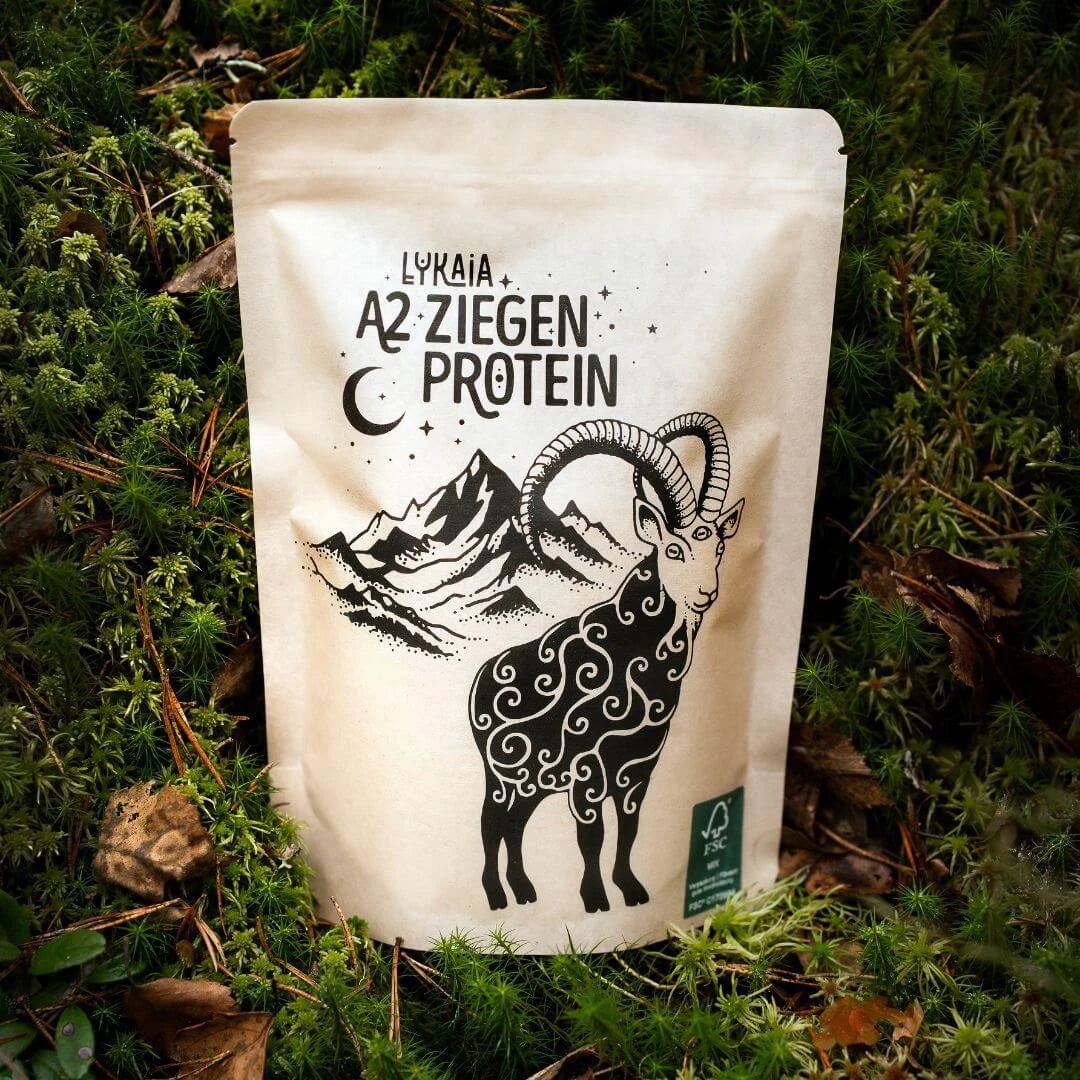Addicted to cheese? A1 casein and its effects...

How exactly does milk affect your body?
The article “The differences between A1 and A2 milk” is about our current dairy culture and the differences between A1 and A2 milk. In addition to the different metabolism of these two types of milk, there are other effects on your body, such as addiction due to opiate-like protein fragments and impaired digestion. In this article you will find out exactly what can happen if you treat yourself to a liter of cow's milk.
A small change with a big impact on your body
What exactly is the difference between A2 and A1 casein? Actually it's just a small change in the amino acid chain (see figure). Due to a mutation, the amino acid proline in the beta-casein in A2 milk has been replaced by histidine. Doesn't sound so wild at first. But it is. Because at the point where the histidine is located, the amino acid chain of A1 casein is broken down in the digestive process. This doesn't happen with A2 beta-casein.
This difference in splitting was only observed 10-15 years ago. The problem with this is this: the split-off part of the A1 beta-casein, also called beta-casomophin 7 (BCM7), acts on your body like an opiate-like substance. At first it sounds like you could catapult yourself into a high-like state with a load of cow's milk, but wait - what else are opiates known for? - That's right, they make you happy because they act on neurotransmitters in the brain and release dopamine. The problem with anything that has a proven effect and makes you happy is that it is also addictive in a certain way because we want more of what makes us happy.
In cow history, this principle turned out to be quite useful, because it is purely beneficial for the mother cow if the calf is a little addicted to her milk in the first few months of life. Through this dependency she guarantees that the calf stays with her. Now we don't necessarily want to be dependent on a cow, we just continue to order our pizza as Quadro Formaggi embedded in a cheesecrust crust. How many people do you know who are vegetarian for the reason that vegan is impossible because they love their cheese so much? I don't want to appeal to any type of diet here; everyone should be allowed to eat animal products if they want to. But it's no secret that dairy products also cause a certain cognitive dependency.
But milk is not alone in this, because almost everything we consume activates the reward centers in our brain to a greater or lesser extent. The absolute overstimulant is sugar, which is why it is the most likely to make us addicted. But if you think about where we actually come from, it's clear: a certain dependence on energy-dense foods used to be necessary, otherwise you forget to eat and hunt and die.
So why am I picking on A1 milk and its opiate-like effects?
Well, the split-off BCM7 causes much more than just addiction in our bodies. By targeting opioid receptors, A1-casein can slow down your digestion, making it sluggish or inefficient. Furthermore, negative effects on the development of newborns and young children have been demonstrated and BCM7 has been found to be a risk factor for apnea (stopped breathing) in some children. In many metabolic and autoimmune sufferers, cow's milk products trigger an immune response because the body detects the split-off BCM7 (and possibly other components of the milk) as an alarm signal and sharpens its weapons. Unfortunately also against your own immune system. It is therefore not surprising that many Lykaia customers are precisely those who have such a previous illness or who generally have a problem with cow's milk protein and find a solution to their problem in A2 milk products.

In addition, there is convincing epidemiological evidence of a connection between BCM7 and the occurrence of coronary heart disease and type 1 diabetes. There may also be other, previously unexplored differences between A1 and A2 casein and their effects on our bodies. Of course, further research is needed, especially with regard to the long-term effects of A1 dairy products and BCM7. A clear statement is never that easy to make. But based on a lot of experience alone, it can be said that A1 milk is not that great for us, especially not in its processed form:
A1 milk is sensitive to processing
To ensure that our cow's milk is germ-free, it is made quite hot and then "pasteurized" is written on the milk carton. Unfortunately, the BCM7 of A1 milk is very sensitive and heating only creates the critical opioid even more quickly. However, milk research has only been informed about this for 10-15 years. That sounds like a long time, but it isn't when you take into account that entire sectors of the economy have to be converted so that something can happen in the supermarket. New Zealand and Australia are already one step ahead of us. Unfortunately that doesn't help you that much, so:
How can you find out if you have A1 milk or A2 milk in your fridge?
If you want to know exactly, read the article: Why is A2 milk healthier? after. If you don't feel like reading more, here's the short answer: Sheep and goat milk products are always based on A2 milk and therefore do not lead to a release of BCM7.
Some cow's milk is also offered, which is labeled as a2 "feel-good milk" and comes from more original cow breeds. We wanted to be on the safe side and therefore decided to use goat's milk as the basis for our protein powder.
Goat's milk instead of cow's milk in ancient times
Excavations of ancient clay jugs from antiquity showed that even at this time, infants were fed goat's milk instead of cow's milk.
Katharina Rebay-Salisbury from the Austrian Academy of Sciences, who was involved in the study, comments: "Goat's milk is most similar to human breast milk and was relatively readily available as sheep, goats and cattle were among the most common domestic animals "But cow's milk was less suitable because it causes diarrhea and digestive problems in babies - this was already known back then."
We'll leave that as an uncommented and nice conclusion to this article. Do you have any suggestions or questions? Feel free to write us a comment or a personal message - here or on Instagram . We look forward to hearing from you!
0 comments







